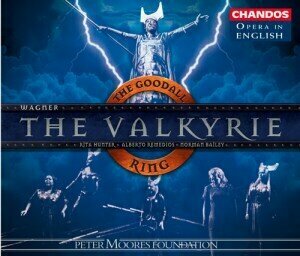
© media.ticketmaster.co.uk
Let’s listen to a few examples.
In Verdi’s La Traviata, the opening of the first scene is enlivened by Alfredo’s brindisi song, ‘Libiamo ne’ lieti calici.’
Verdi: La Traviata: Act I: Libiamo ne’ lieti calici (Luciano Pavarotti, Alfredo; Joan Sutherland, Violetta; London Opera Chorus; National Philharmonic Orchestra; Richard Bonynge, cond. )
Verdi: La Traviata: Act I: Be happy, be happy and raise your glass with me (Alfredo, Violetta, Chorus) (John Brecknock, Alfred; Valerie Masterson, Violetta; English National Opera Chorus; English National Opera Orchestra; Charles Mackerras, cond.)
For some operas, the change in language may not make a difference, as in the entry of the Valkyries at the beginning of Act III of Die Walküre.
Wagner: Die Walküre: Act III, Scene 1: Hoyotoho! Hoyotoho! (Karen Foster, Katherine Broderick, Sarah Castle, Anna Burford, Elaine McKrill, Aurhelia Varak, Okka von der Damerau, Laura Nykänen, The Valkyries; Hong Kong Philharmonic Orchestra; Jaap van Zweden, cond.)
Wagner: Die Walküre (The Valkyrie): Act III, Scene 1: Hoyotoho! Hoyotoho! (Helen Attfield, Katie Clarke, Anne Collins, Elizabeth Connell, Anne Conoley, Anne Evans, Shelagh Squires, Sarah Walker, The Valkyries; English National Opera Orchestra; Reginald Goodall, cond.)

© www.naxosmusiclibrary.com
Puccini: La bohème, Act I: Che gelida manina! (Luciano Pavarotti, – Rodolfo; Studio orchestra ;Emerson Buckley, cond.)
Puccini: La bohème, Act II: Your tiny hand is frozen (Dennis O’Neill, Rodolfo; Philharmonia Orchestra; David Parry, cond.)
English isn’t the only language that European operas were translated into. Many other countries presented works in their native language. There are recordings of Mozart’s Don Giovanni in Hungarian, and Bizet’s Carmen in Hungarian as well.
Bizet: Carmen, Act I: Mert a szerelem mint a lepke (L’amour est un oiseau rebelle), “Habanera” (Erzsebet Komlossy, Carmen; Hungarian State Opera Chorus; Hungarian State Opera Orchestra; János Ferencsik, cond,)
Wagner’s Lohengrin was recorded in Russian, and Verdi’s Aida in German. Handel’s Serse in German makes you wonder how Handel himself thought of his work in its original Italian.
Serse (Xerxes), HWV 40, Act I: Frondi tenere e belle … Ombra mai fu, “Largo” (Jochen Kowalski, Xerxes; Carl Philipp Emanuel Bach Chamber Orchestra; Hartmut Haenchen, cond.)
Handel: Serse [Xerxes]: Act I, Scene 1: Arioso: Schattige Ruh’ (Fritz Wunderlich, Xerxes; Bavarian Radio Symphony Orchestra; Rafael Kubelík, cond.)
It may all come down to taste – do you want to hear Monteverdi in the original or do you want to hear it in a language that’s more familiar? What do you gain and what do you lose? Remembering that any opera involves a long and often cantankerous set of negotiations between the composer and the librettist, what happens when all of that is cast aside?

Opera should be performed in the original It goes without saying!